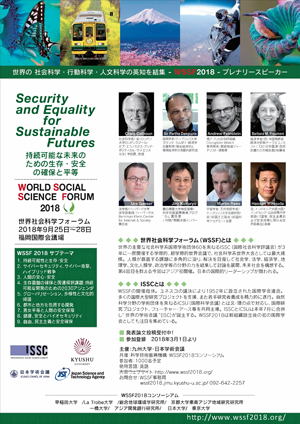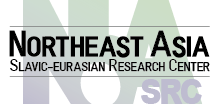2018. 10.23
Talking Infrastructure, Belts and Roads, Connectivity in Asia and Beyond
Mirza Zulfiqur Rahman, PhD, Guwahati, Assam, India
The World Social Science Forum 2018, which was held in Fukuoka, Japan during 25-28 September 2018, had a theme of Security and Equality for Sustainable Futures. This large gathering of social science scholars from around the world became the site of convergence of many interesting academic conversations and exchanges. One of the conversations that I was a part of was within the broader domain of border studies in the world, with particular focus on Asia, its role and strategic outreach to the world. Over the four days, we discussed the contemporary events and geopolitics relating to infrastructure, belts and roads, and connectivity in Asia and beyond. A generous funding by Kyushu University, enabling scholars from various parts of the world, with interdisciplinary backgrounds, to attend WSSF 2018, started such conversations.
An interesting combination of panels at the WSSF 2018 at Fukuoka made for a rich discussion, which included a panel on border studies, which I had the opportunity to moderate along with Edward Boyle of Kyushu University. This set the ball rolling on the broader questions and theorizations of border studies in the contemporary world, which saw definitive presentations being made by Martin van der Velde, Guadalupe Correa-Cabrera, Serghei Golunov and Akihiro Iwashita. The discussions that followed the presentations underlined the importance of the panel, which sparked considerable interest among the audience on wide-ranging issues related to borders in the contemporary world, including political, economic, social and environmental border dynamics and layers, with a focus on broader Asian contexts and experiences.
The panel on Arctic routes, geopolitics and connectivity, co-chaired by Naomi Chi of Sapporo University and Akihiro Iwashita of Kyushu University, which I had attended, brought together scholars who discussed the broader contours of climate change and its strategic dimensions. The Belt and Road Initiative of China came into sharp focus in this panel, as the discussions led to outlining alternative strategies and challenges that the larger Asian region was faced with, as a consequence of mega connectivity projects and ambitions of China. The South China Sea dispute and the non-participation of India in China’s Belt and Road Initiative were potential triggers for China to look seriously at the Arctic routes, and how the larger Asian region need to confront critical questions of sustainability and of long term climate change concerns.
My own panel during the WSSF was on the politics of inclusion and exclusion in the context of sustainable development goals, which was facilitated and moderated by the United Nations Educational, Scientific and Cultural Organization (UNESCO) and the Comparative Research Program on Poverty (CROP), Norway. The discussions during this panel revolved around issues and experiences from diverse regions of the world, including from Africa, Asia and Europe, with speakers from Zambia, Japan and India participating. New insights on the politics of inclusion were juxtaposed in contrast with the already prevailing and dominant economic understanding of inclusion and exclusion in the disciplinary field, and the discussions as a result were rich and contributed to a diverse and interdisciplinary understanding involving politics as core.
I spoke about the politics of inclusion and exclusion of local communities in the development discourse in Northeast India, and how the promise of opening up to Southeast Asia, and being the connecting bridge with South Asia was positioned in a context of democratic deficit and lack of meaningful participation. The manner and method of infrastructural development and connectivity projects in this frontier region of India were excellent examples of how communities were excluded and core issues of environmental protection and long term sustainability was being ignored by the nation-state of India. At the same time, other panelists were talking of examples of India, where grassroots movements were powerful and strong, something to emulated by the Global South. This highlighted the stark contradictions within the same India.
I further travelled after WSSF to Kanazawa, where the 31st Japanese Association of South Asian Studies Annual Conference was being held. I was part of a panel led by Edward Boyle of Kyushu University, which included India’s foremost China specialist Jabin Jacob and environmental historian Rohan DSouza of Kyoto University. The discussions in this panel focused mainly on Northeast India, the challenges of connectivity and infrastructure development in a borderland, which involved China in the proximate neighbourhood. Rohan DSouza took a larger Asian view of connectivity and environment. The discussions were very rich and the question and answer session was reflective of that, as the audience came up with many interesting questions on how connectivity is framed on a very gendered manner.
My last engagement was amidst the spanking new infrastructure of Ito Campus of Kyushu University, in which commemoration the various panels and discussions were possible. The large campus and the infrastructural bounty at once struck me, and we discussed about how something like this is indeed an asset in the long run. The stage was set for another round of discussions on infrastructure and connectivity in Northeast India, to an audience, which comprised of young students and professors of Kyushu University. The discussion brought forward the interesting aspect of how the ‘peripheralization’ of Northeast India, and the borderland politics and contextualization within India’s history could be seen in a comparative perspective and applied to North East Asian contexts as well, as articulated by Akihiro Iwashita.
The core question of democracy was brought up in the discussions, and an interesting comparative dimension of how such democratic practices of resistance took place in a borderland between India and China. It was still possible for local communities in India to stall a mega hydropower dam project for over five years, and how local communities absolutely did not have a chance across the border in Tibet in China, was a testament of how democratic practice was core to how we see development in Asia now and in the long run. I am grateful to Kyushu University for its generous support to enable me to participate in this series of enriching discussions, where I learnt much more than I could contribute. This encourages me to look at development challenges/opportunities in a comparative dimension, and carry forward my research.

.jpg)
.jpg)

 Eurasia Unit for Border Research (Japan)
Eurasia Unit for Border Research (Japan)




